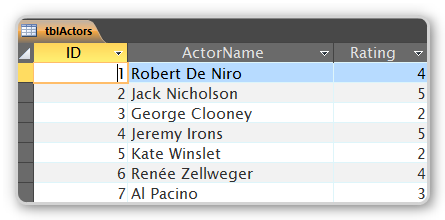Last Update: 2024 - 05 - 21

Access/VBA - How to output data from a column as comma separated string
Published: May 25th. 2015
In online forums or newsgroups dealing with Microsoft Access I frequently read questions about how to get the data from one column in a table or query into a comma (or similar) separated list of values in a string. So basically the rows of one column should be transformed to a string, with the values separated by a delimiter. - Instead of writing an individual answer over and over again, I rather try to write a really good one here, and point to it, if the question arises again. - So here we go...
Let?s say you have got a table with a column containing names (actor's names in this sample). Like this one:

And you want the actor names from this table displayed in one line, like this:

You can solve this problem quite easily with a bit of Access and VBA programming experience. You open a recordset with a query to your table (or query) column. Then, while looping through all the records, you concatenate the values with the desired delimiter in a string and finally return the concatenated string minus the last appended delimiter.
The solution could be something like this:
You can call this function from the Immediate Pane of the VBA-Editor and the output will be printed right below.

The function suports filtering and sorting as well. The following screenshot displays only actors with a rating of 4 or more and sorts it alphabetically. In addition to that we use a dash as separator instead of a comma.

If you put the call to the function in the ControlSource-Property of a textbox control, it will produce the output shown in the screenshot at the beginning of this article.

If you are using DAO for data access there is nothing to add to this. However if you are working with a SQL Server backend and using ADO for data access there might be some other factors to consider. I deal with them in this article describing how to create a comma separated string from an ADO-Recordset in a client-server-scenario using the Clone-, Filter- and Sort- Method/Properties of the ADO-Recordset.
I will never share your email with anyone. You can unsubscribe any time.
This email list is hosted at Mailchimp in the United States. See our privacy policy for further details.
© 1999 - 2024 by Philipp Stiefel - Privacy Policiy




